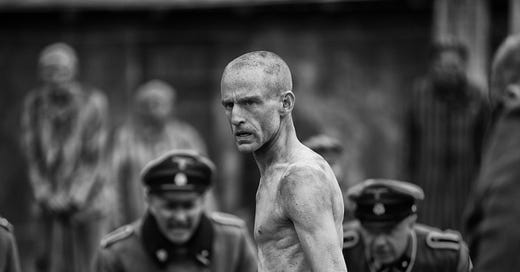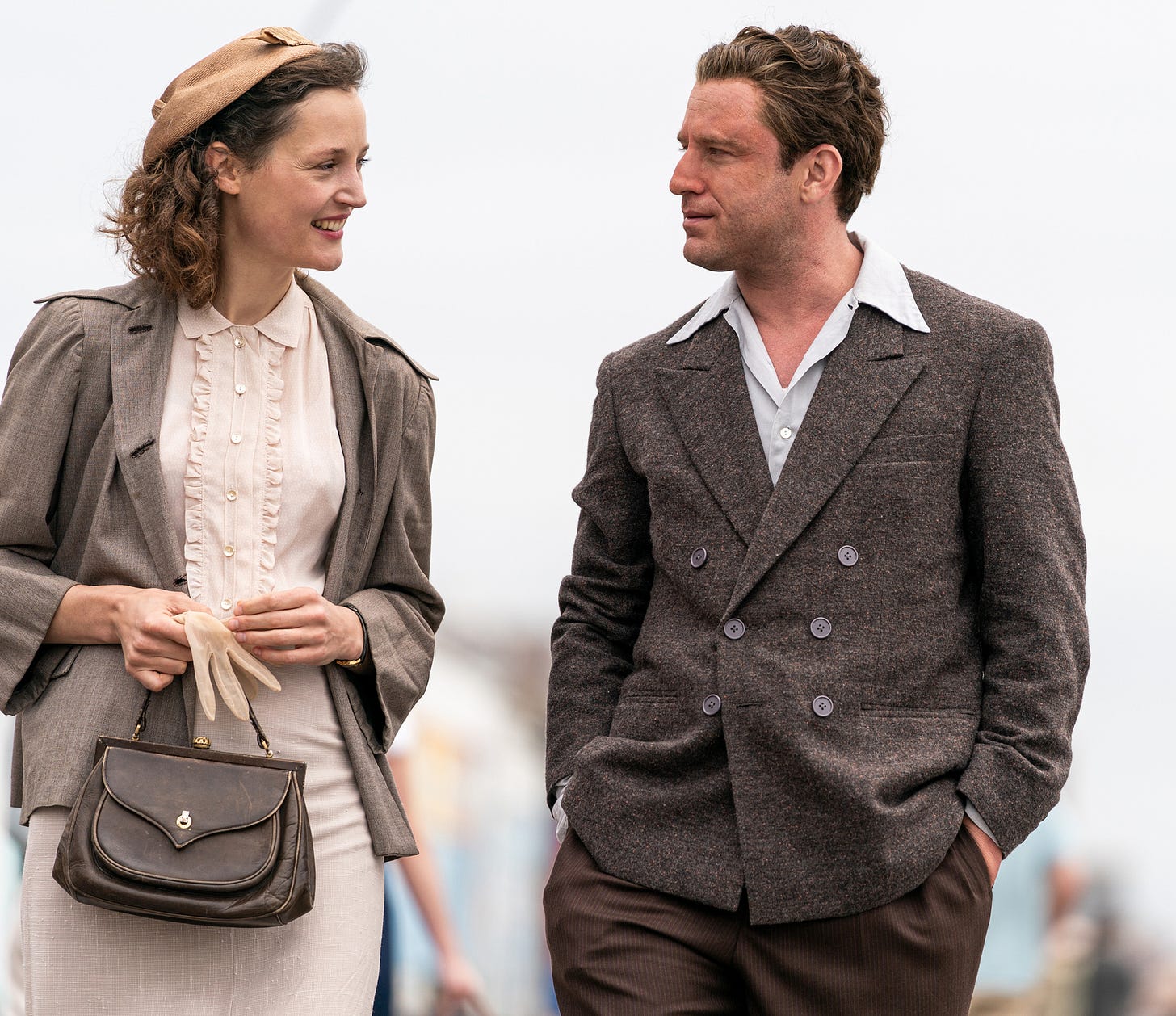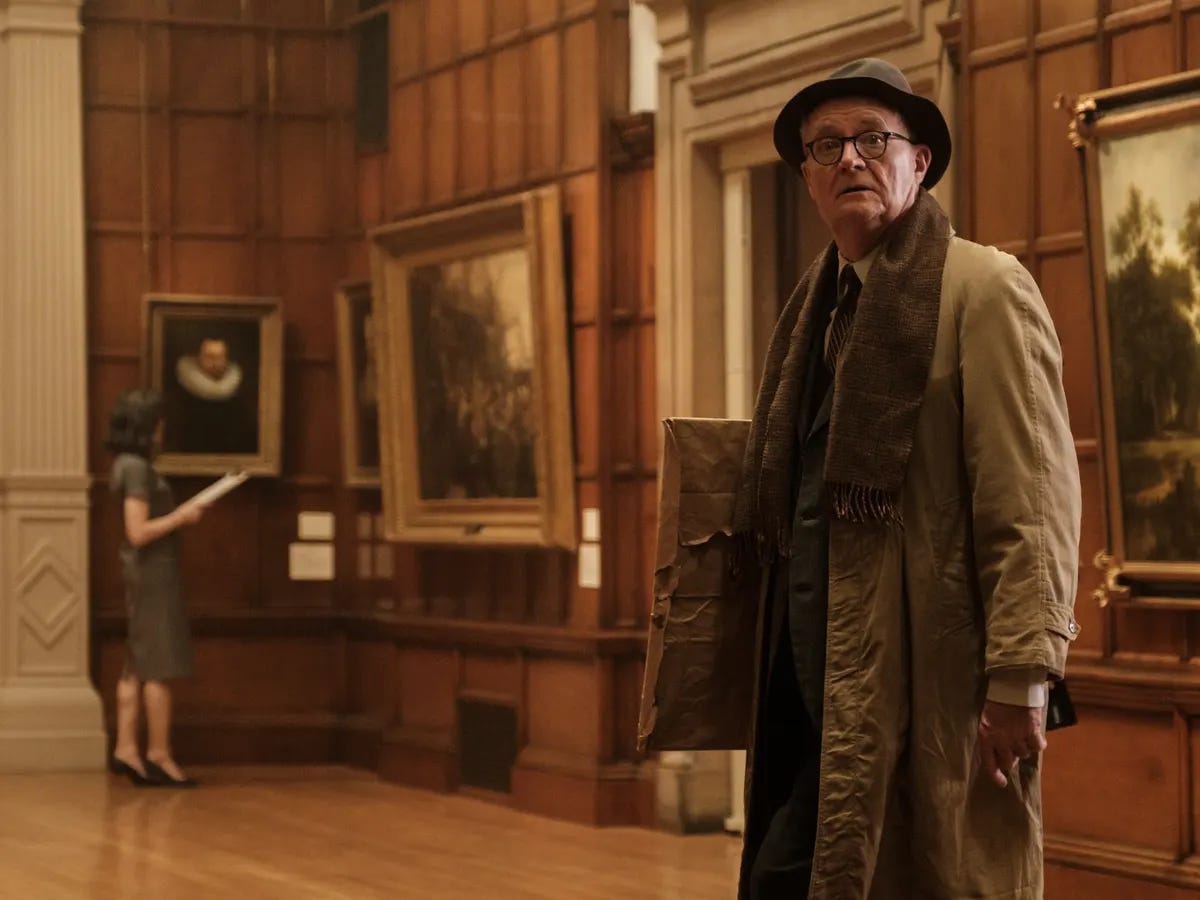The Nut Graf: “The Survivor” (on HBO and HBO Max, *** stars out of ****) is a harrowing and complex story of life after the Holocaust, with a soul-searching performance by Ben Foster. A Parisian gamine wears out her welcome in “Anaïs in Love” (in theaters today, on demand May 6, ** stars out of ****). “The Duke” (in theaters, *** stars out of ****) gives Jim Broadbent a delicious role as the working-class bloke who stole a valuable painting from the National Gallery.
Harry Haft was a Polish Jew, an Auschwitz survivor, and a boxer in the New York tristate area in the years following World War II. His most notable fight was against Rocky Marciano in 1949; his larger battle was against himself. During his time in the camps, Haft was picked by an SS officer to be his pet fighter, squaring off against other emaciated prisoners in makeshift outdoor boxing rings. The winner got to live. Haft fought 78 bouts against his fellow Jews and then made his way to America, the land of the free, where he kept swinging at things, like a lab monkey still feeling the shock. How long can you throw a punch before you knock yourself out?
“The Survivor,” a new film premiering on HBO and HBO Max, tells Haft’s story with style, conviction, a heavy hand in the dialogue, and an editing approach that dices up chronology in ways that sometimes make sense and other times feel glib. Aside from the singularity of the story it tells, the movie has two things going for it: Ben Foster in the lead and a knowledge of how guilt and trauma can fuse a person into a black hole of self-loathing. That’s a tale at least as old as Sidney Lumet’s “The Pawnbroker” (1964), the first American movie to show the Holocaust from a survivor’s point of view, but it takes on less easily digested complexities in “The Survivor” – crosscurrents of complicity, terror, shame, and pride that keep shuffling and reshuffling. Slightly overcooked and definitely overlong, the movie’s still the best thing Barry Levinson (“Diner,” “Rain Man,” “Wag the Dog”) has done in decades.
You’ve probably seen Ben Foster in a movie before without realizing it; there’s a strange, intense anonymity to his performances. He comes in, hijacks a movie, and is gone before you know what hit you. He was the hair-trigger bad brother in “Hell or High Water” (2016) and the Iraq War vet hiding with his daughter in the Oregon woods in “Leave No Trace” (2018). Back in 2007, Foster was a standout as Russell Crowe’s sadistic right-hand gunslinger in the remake of “3:10 to Yuma.” As Haft, the actor does one of those Robert de Niro/Christian Bale “look how I torture my body in the name of craft” things, where’s he’s a gaunt specter in the Auschwitz scenes and a barrel-chested fireplug in the postwar sections, verging on a corpulence that tips over during an arguably unnecessary epilogue set in 1963. The morphing convinces, but not as much as the veiled emotions swimming in the back of Harry Haft’s eyes. In other movies, Foster’s eyes can burn with anger or insolence or sorrow. Here they just seem to want to hide the things Harry has seen.
The film’s a hard watch, despairingly violent in the camp scenes and livid with Scorsesean close-fighting in the ring sequences. Haft’s unshakable solitude is leavened by the supporting characters: John Leguizamo as his manager, Vicky Krieps of “Phantom Thread” as a careworn love interest, Danny DeVito in and out as a seen-it-all boxing coach. Billy Magnussen (“No Time to Die”) is especially chilling as the SS officer who takes Haft under his wing; he’s friendly and soulless and absolutely sure the world is divided into victors and victims, the hammer and the anvil, and which does Haft want to be? In the years after the war, those who love Harry tell him he had no choice, no one had any choice, but he knows better and so do we. “The Survivor” is about whether forgiveness is possible for unforgivable sins, where that forgiveness might come from and why. The movie is based on a memoir by Haft’s son Alan, played as a boy in the film by Kingston Vernes, and it’s very much the work of a son still puzzling over the mystery of his father. In this, it feels like a not-so-distant cousin to “Avalon,” Levinson’s 1990 movie about Jewish assimilation in postwar America and a story much closer than “The Survivor” to his own.
Among the new releases in theaters today are “Anaïs in Love,“ a French comedy-drama that couldn’t be more French, and “The Duke,” a movie so British it should come with a side of kidney pie. As played with brittle charm by Anaïs Demoustier, the title character in “Anaïs” is a young Parisian woman seeking meaning and passion while dashing impulsively from one bad idea to the next. She has phobias (elevators, the Métro), a doting husband (Christophe Martinez) she can’t bring herself to live with, a married lover (Denis Podalydès) she finds tedious, and a doctoral thesis she never seems to finish – and all of this before she conceives a stalkery crush on the married lover’s partner (an excellent Valeria Bruni Tedeschi), a successful writer. Written and directed by Charline Bourgeois-Tacquet, “Anaïs in Love” looks at infidelity with a very Gallic shrug, which is fine, I’d expect no less. But the movie also illustrates that point where a breezy, breathy free spirit becomes a pain in the ass – it resembles “The Worst Person in the World” with the difference that Anaïs might actually be the worst person in the world. Is that intentional? It’s never clear, which is the movie’s failure. That said, Demoustier gives a remarkable mercury bead of a performance, unpredictable and fearless and very present tense. You never doubt that the actress is committed, even if you think her character should be. (Available on demand May 6.)
“The Duke” isn’t just British, it’s Birmingham British, with thick Brummie accents that swallow entire sentences before our dull American ears can understand what we just heard. But it’s a daft, lovely story, and it opens up like a flower – the final half hour is deeply and unexpectedly moving. It’s the true story of Kempton Bunton (Jim Broadbent), an aging working-class duffer with social-idealist bees in his bonnet, who in 1961 stole Goya’s “Portrait of the Duke of Wellington” from the National Gallery in London. The theft was impulsive – sparked by Bunton’s outrage over the British Government spending £14,000 to buy the painting while charging citizens a license fee to watch television – and there’s good comedy in his attempts with his son (Fionn Whitehead) to hide the purloined Goya from wife Dorothy, played by Helen Mirren in dowdy charwoman mode. Broadbent is always worth watching when he gets a lead, and what seems an amusing ramble through a minor chapter in British eccentricity becomes something larger when Bunton is caught and put on trial. There everyone present is charmed by the character’s imperturbable humor and doughty sense of self and, more affectingly, by Bunton’s belief in a society that’s communal and caring – the notion that I am you and you are me and if we don’t look out for each other, what’s the point? By the final scenes of “The Duke,” this lumpy old soul has taken on the stature of William Blake, the common-man mystic who saw the threads connecting us all, and as if to underscore the point, here comes Blake’s “Jerusalem” on the soundtrack, a hymn that never fails to bring some of us to tears. It’s all handled with a deft touch by director Roger Michell, who had a varied and variable career before his death last fall at 65. Among Michell’s finest works are a much-loved BBC version of Jane Austen’s “Persuasion” (1995), the hit romantic comedy “Notting Hill” (1999), “Venus” (2006), which features the last great performance from Peter O’Toole – and this movie.
If you enjoyed this edition of Ty Burr’s Watch List, please feel free to share it with friends.
If you’re not a paying subscriber and would like to sign up for additional postings and to join the discussions, here’s how:
If you’re already a paying subscriber, I thank you for your generous support.







